八年级U1T3导学案
八年级英语外研版上册Module1_Unit3_同步导学案1

Module 1 How to learn EnglishUnit 3 Language in use第一课时一、学习目标:1. 复习并学会灵活运用本模块重点词汇和句型2. 巩固熟练运用本模块所学知识对有关英语学习的话题给别人提建议二、学习重点:通过复习巩固熟练运用本模块重点词汇和句型关于英语学习给别人提出建议三、学习难点:灵活运用本模块所学知识提出建议课前预习一、使用说明与学法指导:1. 自主复习Unit 1, 2的重点词汇和句型2. 熟背Unit 1的对话和Unit 2的文章,有疑惑的地方用红笔标记并在组内探讨解决二、教材助读:1. 理解并熟读本单元Language practice部分的句子,尝试总结有关提出建议的表达2. 自主学习课本语法部分关于本模块的知识三、预习自测(一) 回顾完成下列单词及短语:1 . 建议,提议(名词)2 . 理解;明白3 . 拼写4 . 广播5 . 大声地6 . 改进,改善7 . 应该8 . 理解;明白9. 害怕做某事10. 开始谈话11. 建议某人做某事12. 向……提出意见13. 对某人微笑14. 忘记做某事(二) 回顾总结提建议的句型:_____________________________________________________________________________ _____________________________________________________________________________ _____________________________________________________________________________ _____________________________________________________________________________ _____________________________________________________________________________ _____________________________________________________________________________四、我的疑问:_____________________________________________________________________________ _____________________________________________________________________________课内探究一、情景导入:借助Language practice中的句子回顾本模块重点二、质疑探究(一) 句型总结1. 回顾本模块所有提建议的句子2. 巩固提建议的句型_____________________________________________________________________________ _____________________________________________________________________________ _____________________________________________________________________________ _______________________________________________________________________________________________________________________________________________________________________________________________________________________________________(二) 逐步完成本单元练习,巩固词汇和句型的运用三、当堂检测(一) 单项选择( ) 1 . Don’t forget _________ me as soon as you arrive in Beijing.A . callingB . callsC . callD . to call( ) 2 . Write them _________ a piece of paper and put them in your bedroom.A . onB . toC . downD . back( ) 3 . She told us the good news with _________ smile ___________ her face.A . a ; inB . an ; inC . a ; onD . an ; on( ) 4 . Can you __________ it in English?A . speakB . sayC . talkD . tell( ) 5 . __________ natural to forget new words.A . ItB . ThatC . ThisD . It’s(二) 默写本模块关于提出建议的句子___________________________________________________________________________________________________________________________________________________________________________________________________________________________________________________________________________________________________________________________________________________________________________________________________________________________________________________________________________________________________________________________________________________________四、课后反思__________________________________________________________________________________________________________________________________________________________课后训练一、完形填空(10分)There is some 1 for you about learning English well. Firstly, it's a good way 2 your English 3 reading, so do more reading every day, but 4 try to translate every word when you read an English article. Secondly, do more listening exercises. You should repeat the sentences 5 you hear them. It's good 6 your pronunciation. Sometimes, we offer (提供) exercises to you to number the pictures, or find the mistakes in the sentences and then correct 7 . Thirdly, try to speak to foreigners. Don't be afraid of 8 mistakes. Take a deep breath and start a conversation with them. Always remember to enjoy yourself 9 English learning, 10 you will surely be good at it sooner or later.( ) 1.A. advice B.advices C.information D.ways( ) 2.A. improve B.to improve C.improves D.improving( ) 3.A. with B.in C.by D.at( ) 4.A. no B.not C.don't D.not to( ) 5.A. about B.before C.by D.when( ) 6.A. to B.with C.for D.at( ) 7.A. it B.them C.her D.his( ) 8.A. make B.making C.makes D.to make( ) 9.A. in B.at C.with D.by( ) 10.A. and B.or C.but D.finally(三) 阅读理解The best way of learning EnglishThe best way of learning a language is by using it. The best way of learning English is talking in English as much as possible. Sometimes you will get your words mixed up and people will not understand you. Sometimes people will say things too quickly and you can't understand them. But if you keep your sense of humour, you can always have a good laugh at the mistakes. Don't be unhappy if people seem to be laughing at your mistakes .It is much better for people to be laughing at your mistakes than to be angry because they don't understand what you are saying. The most important rule for learning English is, “Don't be afraid of making mistakes; e veryone make mistakes.”( ) 1. The best way of learning a language is ______.A.to remember the grammar rules B.to use it as often as you canC.to try not to get your words mixed up D.to make a lot of mistakes( ) 2. When people laugh at your mistakes, ______.A.you should be angry B.you must stop talking at onceC.you should keep your sense of humour D.you must be very careful next time( ) 3. The most important rule for learning English is ______.A.to try to make fewer mistakes B.not to be afraid of making mistakesC.to be brave to talk to others in English D.both B and C( ) 4. Tom, Jerry, Bob and Mike are learning English. Who do you think is right?A.Tom tries to use English as much as possible.B.Jerry is always shy of speaking English.C.Bob is afraid that others may laugh at him.D.Mike never tries to talk to others in English.( ) 5.The passage seems to tell us ______.A.that you should learn to laugh at mistakesB.that it's interesting to learn EnglishC.what to do when you make mistakes while talking EnglishD.how to make others understand you第二课时一、学习目标:1. 学会指定有关英语学习的计划2. 练习巩固本模块重点知识3. 学会合理安排计划自己的学习和生活二、学习重点:学会制定有关英语学习的计划,练习巩固本模块重点知识三、学习难点:学会制定有关英语学习的计划课前预习一、使用说明与学法指导:1. 自主学习Around the world2. 思考并组内探讨如何制定自己的英语学习计划二、教材助读:1. 预习Around the world,了解关于英语学习的多种媒介2. 预习Module task,小组讨论如何指定自己的英语学习计划三、预习自测完成Module Task部分四、我的疑问:__________________________________________________________________________________________________________________________________________________________课内探究一、情景导入交流检查预习作业二、质疑探究组内交流,以对话形式对Module task进行问答三、当堂检测个人活动,以完整的句子对自己及小组成员Module task表格内容进行描述,在班级内展示四、课后反思_____________________________________________________________________________ _____________________________________________________________________________课后训练写一篇小作文,制定你自己关于英语学习的计划。
人教新目标版八年级英语下册Unit1-3精品导学案
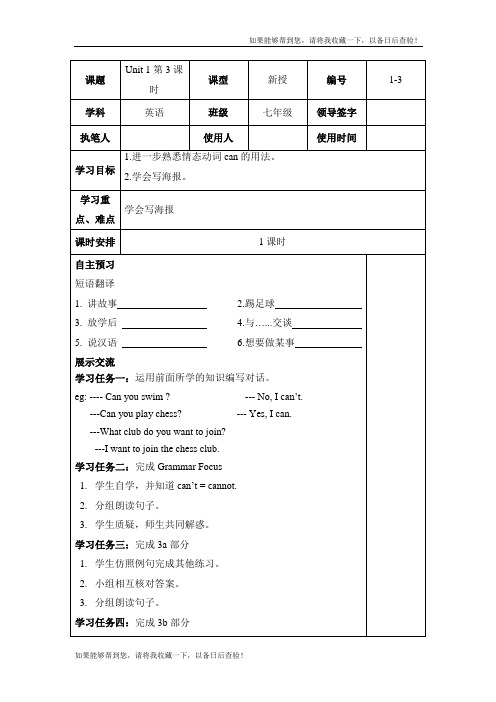
7. What can you do ? _________A. I’m Lucy.B. Fine.C. I can draw.D. Sorry, I can’t.关注“初中教师园地”公众号各科最新备课资料陆续推送中快快告诉你身边的小伙伴们吧~本课教学反思英语教案注重培养学生听、说、读、写四方面技能以及这四种技能综合运用的能力。
写作是综合性较强的语言运用形式, 它与其它技能在语言学习中相辅相成、相互促进。
因此, 写作教案具有重要地位。
然而, 当前的写作教案存在“ 重结果轻过程”的问题, 教师和学生都把写作的重点放在习作的评价和语法错误的订正上,忽视了语言的输入。
这个话题很容易引起学生的共鸣,比较贴近生活,能激发学生的兴趣, 在教授知识的同时,应注意将本单元情感目标融入其中,即保持乐观积极的生活态度,同时要珍惜生活的点点滴滴。
在教授语法时,应注重通过例句的讲解让语法概念深入人心,因直接引语和间接引语的概念相当于一个简单的定语从句,一个清晰的脉络能为后续学习打下基础。
此教案设计为一个课时,主要将安妮的处境以及她的精神做一个简要概括,下一个课时则对语法知识进行讲解。
在此教案过程中,应注重培养学生的自学能力,通过辅导学生掌握一套科学的学习方法,才能使学生的学习积极性进一步提高。
再者,培养学生的学习兴趣,增强教案效果,才能避免在以后的学习中产生两极分化。
在教案中任然存在的问题是,学生在“说”英语这个环节还有待提高,大部分学生都不愿意开口朗读课文,所以复述课文便尚有难度,对于这一部分学生的学习成绩的提高还有待研究。
教学反思1 、要主动学习、虚心请教,不得偷懒。
老老实实做“徒弟”,认认真真学经验,扎扎实实搞教研。
2 、要勤于记录,善于总结、扬长避短。
记录的过程是个学习积累的过程,总结的过程就是一个自我提高的过程。
通过总结,要经常反思自己的优点与缺点,从而取长补短,不断进步、不断完善。
3 、要突破创新、富有个性,倾心投入。
外研版英语八年级下册Module1 Unit3 精品导学案

Module1 Unit3 精品导学案【学习目标】1. 知识目标:1. 掌握句型What does he look like? 与What is he like? 的区别。
2. 复习并运用表示感觉和知觉的系动词、本模块的重点单词、短语及句型。
2. 能力目标:能够用口头的方式表达对事物的感觉、以口头及书面的方式描述人的外貌和性格。
3. 情感目标:学会和陌生人交流。
【重点及难点】1.重点:表示感觉和知觉的系动词句型What+do/does+主语+ look like? 与What +be+主语+ like? 的区别:(1)What+do/does+主语+ look like?:着重问人物长相,look是看上去,即看上去是个什么样;(2)What +be+主语+ like?: 着重人的内在性格、人品,是个什么样的人。
2. 难点:用口头及书面的方式表达对事物的感觉、描述人的外貌和性格。
【学习步骤】Step 1. Read these sentences.It tastes good.You look very pretty.It doesn’t smell fresh.I feel nervous when I speak Chinese.Step2. Look at the picture. Complete the sentences.e.g. The cookies taste delicious.1. The bananas ____________________.2. The students ____________________.3. The flowers _____________________.4. The juice _______________________.5. The chair _______________________.6. The music ______________________.Step3. Write sentences about yourself. Use the words in the box to help you.e.g. I like this dress very much. It feels comfortable.I like pandas. They look funny and friendly.Step4. Put the words into the correct columns.Step5 Use the table in Activity 3 to ask and answer questions about the people.your mumA: What does your mum look like?B: She’s tall and beautiful.A: What is your mum like?B: She’s friendly.1. your dad2. your maths / Chinese / music teacher3. your uncle4. your best friendStep6. Complete the conversation with the correct form of the words in the box. You need to use some of the words more than once.Jane: Hi, Alex! How are you today?Alex: Great!Jane: You (1) _____ very happy!Alex: Oh, yes. My mum made a cake for me. Here, have some. It really (2) _____ delicious!Jane: Thanks. It (3) _____ very pretty too. Mm, you’re right. It’s nice.Alex: And another good things is, my friend Ben is coming to stay.Step7. Complete the passage with the words in the box.Americans usually shake hands with each other when they first (1) _____. When two Americans are talking, they do not stand too (2) _____ to each other.If they meet some friends at a party while they are talking (3) ____ someone else, they usually bring their friends into the conversation. Americans (4) _____ each other in the eye when they talk. They may be a bit (5) _____ sometimes, but they are quite (6) _______.Step8. Write about how things feel, look, smell, sound or taste. Use the words in the box to help you.e.g. Flowers look beautiful. They smell nice.Step9. Describe a thing in the box to your partner. Your partner should guess what it is. Use the words in the box in Activity 7 to help you.A: It looks beautiful.B: Is it a flower?A: No, it isn’t.It’s round and hot.B: Is it a lantern?A: No, it isn’t.It’s much hotter and bigger than a lantern.B: Is it the sun?A: Yes, you’re right.Step10 Listen and complete the notes. What is the speaker complaining about?Step11 Read the passage and fill in the blanks.In the West, people are quite open about their feelings. Many people hug each other when they meet. People are friendly and informal. They usually use given names, even at work. It is polite for people to say “thank you〞very often, even to their family members.1. People in the West are quite ____ about their feelings.2. Many people ____ each other when they meet.3. People in the West are _______ and ________.4. It is _____ for people to say “thank you〞to others.【知识构造】●感官系动词本模块我们学习了表示感觉和知觉的系动词feel、taste、look、smell、sound,它们和最常用的系动词be一样后面加(词性) 作表语。
八年级上册Unit1第三导学案
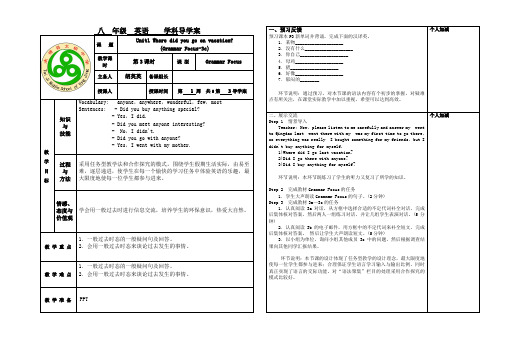
八年级英语学科导学案课题Unit1 Where did you go on vacation?(Grammar Focus-3c)教学课时第3课时课型Grammar Focus 主备人胡英英备课组长授课人授课时间第 1 周共5第 3导学案教学目标知识与技能Vocabulary: anyone,anywhere,wonderful,few,mostSentences: - Did you buy anything special?- Yes,I did.- Did you meet anyone interesting?- No,I didn't.- Did you go with anyone?- Yes,I went with my mother.过程与方法采用任务型教学法和合作探究的模式,围绕学生假期生活实际,由易至难,逐层递进,使学生在每一个愉快的学习任务中体验英语的乐趣,最大限度地使每一位学生都参与进来。
情感、态度与价值观学会用一般过去时进行信息交流,培养学生的环保意识,热爱大自然。
教学重点1.一般过去时态的一般疑问句及回答。
2.会用一般过去时态来谈论过去发生的事情。
教学难点1.一般过去时态的一般疑问句及回答。
2.会用一般过去时态来谈论过去发生的事情。
教学准备PPT 一、预习反馈预习课本P3新单词并背诵,完成下面的汉译英。
1.某物____________________2.没有什么____________________3.你自己____________________4.母鸡____________________5.猪____________________6.好像____________________7.郁闷的________环节说明:通过预习,对本节课的语法内容有个初步的掌握,对疑难点有所关注,在课堂实际教学中加以重视,希望可以达到高效。
个人加减二、展示交流Step 1 情景导入Teacher:Now,please listen to me carefully and answer my wentto Qingdao last went there with my was my first time to go there,so everything was really I bought something for my friends,but Ididn't buy anything for myself.1)Where did I go last vacation?2)Did I go there with anyone?3)Did I buy anything for myself?环节说明:本环节既练习了学生的听力又复习了所学的知识。
八年级英语下册Unit1第3课导学案.docx
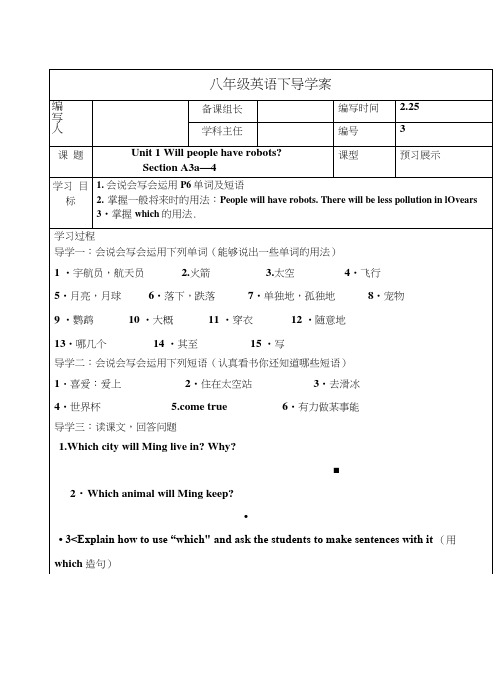
八年级英语下导学案编写人备课组长编写时间 2.25 学科主任编号 3课题Unit 1 Will people have robots?Section A3a—4课型预习展示学习目标1.会说会写会运用P6单词及短语2.掌握一般将来时的用法:People will have robots. There will be less pollution in lOvears 3•掌握which的用法.学习过程导学一:会说会写会运用下列单词(能够说出一些单词的用法)1 •宇航员,航天员 2.火箭 3.太空4•飞行5•月亮,月球6•落下,跌落7•单独地,孤独地8•宠物9 •鹦鹉10 •大概11 •穿衣12 •随意地13•哪几个14 •其至15 •写导学二:会说会写会运用下列短语(认真看书你还知道哪些短语)1・喜爱:爱上2•住在太空站3•去滑冰4•世界杯 e true 6•有力做某事能导学三:读课文,回答问题1.Which city will Ming live in? Why?■2・Which animal will Ming keep?•• 3<Explain how to use “which" and ask the students to make sentences with it (用which造句)4.3a.Read 3a by heart and fill in the chart (读课文,填表格)导学四:知识梳理1.. I might even keep a pet parrot•我甚至可能养一只宠物鹦鹉。
might是may的虚拟语气形式,是情态动词,表示现在或将来“可以”,“可能”做某事,语气委婉、客气,有时也表示对可能性有所怀疑。
eg. 1) I _________ even visit Australia.我可能去澳大利亚旅行。
2) She _________ have a parrot.她有可能养一只鹦鹉。
英语八年级上册Unit1第三课时导学案

3、运用重点句型反复造句,并以小组形式展示。
示学:
1、C层同学展示自己对基础知识的学习。
2、组长带领组员解读课文,并勾画出不理解的地方。
3、各组之间两两交换疑惑并解决。
(中考链接)
1、他决定开车去北京。
HetotoBeijing.
2、我感觉他是我父亲。
Ihe is my father.
检学:
1、和同伴讨论2a问题。(并在黑板展示)
(1)What do people usually do on vacation?
(2)What activities do you find enjoyable?
2、话题写作。
假如你是林涛,去年夏天去北京度假,参观过许多地方。以My Vacation为题目,写一篇70词左右的短文。
because和because of
1.because为连词,意为“因为”,之后跟从句。
2.because of也意为“因为”,是复合介词,后接名词、代词、动名词、或相当于名词的词组。
二、能力提升
1、阅读2b有关简的假期日记并回答问题。
2、再读一遍2b简的日记,2c表格。
我的疑惑
在阅读的过程中没有必要浪费时间在搞懂每个词的意思,这样只会浪费时间而且对做题没有什么帮助,对于生词根据上下文推断其大致意思即可。
(3)because of ______________ (4)too many____________
(5)something important____________ (6)feel like___________
2.完成1a和1b并组织内进行交流。
对于阅读理解,应用“主旨大意法”解题。即大体浏览文章明白大意,并提炼文章主旨即每一段的主旨,再做题选择合适的选项。
英语八年级下册Unit1第一课时和第三课时导学案
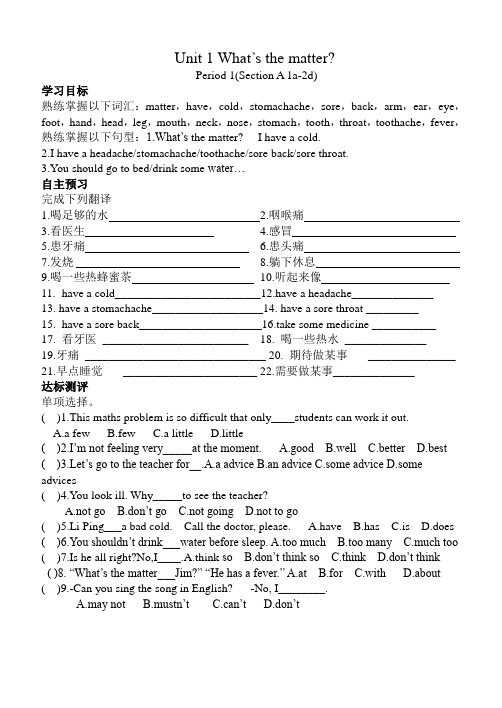
Unit 1 What’s the matter?Period 1(Section A 1a-2d)学习目标熟练掌握以下词汇:matter,have,cold,stomachache,sore,back,arm,ear,eye,foot,hand,head,leg,mouth,neck,nose,stomach,tooth,throat,toothache,fever,熟练掌握以下句型:1.What’s the matter? I have a cold.2.I have a headache/stomachache/toothache/sore back/sore throat.3.You should go to bed/drink some water…自主预习完成下列翻译1.喝足够的水2.咽喉痛3.看医生4.感冒5.患牙痛6.患头痛7.发烧8.躺下休息9.喝一些热蜂蜜茶10.听起来像11. have a cold_________________________12.have a headache______________13. have a stomachache___________________14. have a sore throat _________15. have a sore back_____________________16.take some medicine ___________ 17. 看牙医_________________________ 18. 喝一些热水______________19.牙痛_______________________________ 20. 期待做某事_______________ 21.早点睡觉_______________________ 22.需要做某事______________达标测评单项选择。
( )1.This maths problem is so difficult that only____students can work it out.A.a fewB.fewC.a littleD.little( )2.I’m not feeling very_____at the moment. A.good B.well C.better D.best ( )3.Let’s go to the teacher for__.A.a advice B.an advice C.some advice D.some advices( )4.You look ill. Why_____to see the teacher?A.not goB.don’t goC.not goingD.not to go( )5.Li Ping___a bad cold. Call the doctor, please. A.have B.has C.is D.does ( )6.You shouldn’t drink___water before sleep. A.too much B.too many C.much too ( )7.Is he all right?No,I____.A.think so B.don’t think so C.think D.don’t think ( )8. “What’s the matter___Jim?” “He has a fever.” A.at B.for C.with D.about ( )9.-Can you sing the song in English? -No, I________.A.may notB.mustn’tC.can’tD.don’t( )10.Must I finish my homework in class? No, you_______.A.can’tB.mustn’tC.needn’tD.may not( )11.John __come to see us tonight, but he isn’t sure yet. A.may B.can C.must ( )12.The traffic____stop when the lights are red. A.must B.mustn’t C.m ayD.can( )13.We___sleep early to be healthy.A.can’t B.don’t have to C.shouldn’t D.should ( )14.-My mother is ill in hospital. -_______________. A.What’s the matter? B.I’m sorry to hear that. C.I’m not feeling well. D.She’ll be all right so on.( )15.-__________? -I have a sore throat , doctor. A.What wrong with you B.What’s matter with you C.What’s the matter D.What’s your question( )16.The old man cried to me, showing his ______. A.tooth B.teeth C.toothes ( )17.You look ill. Do you have _______?A. a coolB. bad coldC. a bad coldD.a badly cold( )18.Do you have a headache or a _______? A.toothache B.teethache C.tooth ( )19.Xiao Wang has a sore___.He should drink more water. A.eye B.back C.legD.throat( )20.“What’s ____matter with you?” “I have a fever.” A.a B.an C.the D./本课时重要知识点:1. What’s the matter (with you)? 怎么了?出什么事了?What’s the trouble/ the problem / wrong with sb./ sth.?2. have a cold=catch a cold=have the flu have a cough 咳嗽\3. 身体部位+ache (疼痛)构成新的复合词stomach+ache=stomachachehead+ache=headache tooth+ache=toothache back+ache=backache 后背痛4. enough 【形容、副词】足够的/ 地enough可放在名词前面,enough money放在形副后good enough 足够好。
新外研版八年级英语下册导学案Module 1(Unit 1~Unit 3)

外研版 八年级英语下册导学案Module 1 Feelings and impressionsUnit 1 It smells delicious.【学习目标】1. 知识目标:能够正确运用表示感觉和知觉的系动词,并且识记本单元的单词、重点短语: Smell, soft, sour, lovely, try, have a try, sound, salt,favourite 等等。
2. 能力目标:能够听懂本单元中表示感觉和知觉的系动词(sound, smell, look,taste, feel)表述的内容并能与图片匹配。
3. 情感目标:通过学习表达对事物的感觉能够更好地理解别人,从而更懂得关爱别人。
【重点及难点】1. 重点:掌握句子的系表结构:linking verb+adj. (系动词+形容词)。
2. 难点:运用表示感觉和知觉的系动词表达对事物的感觉。
【学习步骤】 :一、 课前预习【自主学习】I 、完成下列关于五官及其感觉的图示:We use our eyes / noses / hand s / mouths / ears to …Five senses ,, , , eye, lookII.结合课本2页的对话,试着翻译下列词组、重点句子。
1.①②想要做某事2. 在顶部3. 恐怕4. ①②一点儿5. 做完了6. 试试看7. 在中间8. 对甜食的爱好9. 确信10. 草莓酱11. 今天是我的幸运日二、课堂学习过程【合作探究】Step 1. Read the conversation on page 2, and complete the table.food How ... ?looks so nice ,smellstastessmells ,tastestastefeel in the middlesoundcaketastestastesStep 2. Practise speaking like this:E.g. The pizza looks/smells/tastes...【归纳总结】上述句子中的look、smell、taste、feel、sound 叫做,他们与be动词一样也被叫做系动词。
冀教版八上-八年级上 Unit1 第:3 导学案
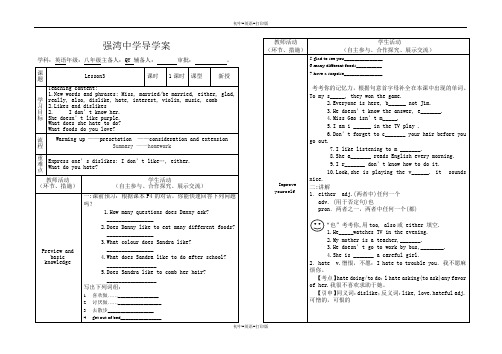
3.There are some new things in today 's newspaper (改为同义句)
There is _____ _____ in today’s news-paper.
4.He dislikes taking a bus.(改为同义句)
强湾中学导学案
教师活动 (环节、措施)
学生活动 (自主参与、合作探究、展示交流)
学科:英语年级:八年级主备人:QY辅备人:审批:,
Improveyourself
5glad to see you_______________
6many different foods__________
7have a surprise_______________
He _____ _____ a bus.
5.What’s the matter with you ,Tom? (改为同义词)
______ ______with you ,Tom?
6.I have trouble others.(改为一般疑问句)
______ you ______to trouble others?
9.I r_______ don’t know how to do it.
10.Look,she is playing the v______. it sounds nice.
二:讲解
1.either adj.(两者中)任何一个
adv.(用于否定句)也
pron.两者之一,两者中任何一个(都)
“也”考考你,用too, also或 either 填空.
【考点】hate doing/to do:l hate asking(to ask)any favor of her.我很不喜欢求助于她。
外研版英语八年级上册 Module 1 Unit 3 导学案

外研版英语八年级上册Module 1 Unit 3 导学案Unit 3Language in use语法提能导练1. We should always speak English in class.2. Let's try to speak English as much as possible.3. Why not write down our mistakes in our notebooks4. It's a good idea to spell and pronounce new words aloud.5. How about listening to the radio语法详解表示建议的句型句型意义Sb. should/shouldn't do ... 某人应该/不应该做……Let's try to do … 让我们努力做……Why not do …?为什么不做……呢?Why don't we/you do …?我们/你(们)为什么不做……呢?It's a good idea to do … 做……是一个不错的主意。
How/What about …?……怎么样?一、单项填空。
D 1. How about ________ back to him about itA. writeB. to writeC. wroteD. writingC 2. It's a good idea ________ your parents to help you.A. askB. askedC. to askD. askingB 3. —So long time for your homework, Simon. Why not ________ eye exercises—Sounds great.A. to stop to doB. stop to doC. to stop doingD. stop doingA 4. Let me ________ you around our country.A. showB. to showC. showingD. showedD 5. ________ fly kites with your classmates this weekendA. Why not youB. Why don'tC. Why not weD. Why don't you二、句型转换。
八年级下册Module1Unit 3导学案
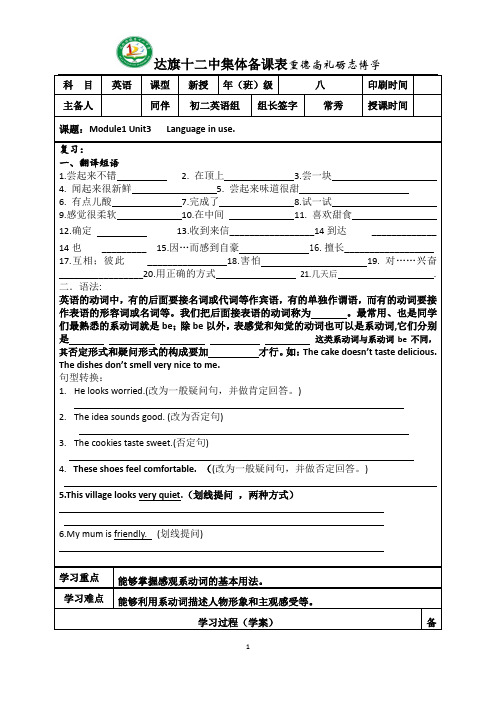
课后反思:
安全提示:不玩火不带易燃品进入校园。
2.Write sentenceswith sense verbs.(Activity2/7)
3.Put the words in the box in the correct columns.(Activity3)
4.Pairwork:
A: What does your mum look like?
14也_________15.因…而感到自豪16.擅长__________________
17.互相;彼此________________18.害怕19.对……兴奋_________________20.用正确的方式21.几天后.
二.语法:
英语的动词中,有的后面要接名词或代词等作宾语,有的单独作谓语,而有的动词要接作表语的形容词或名词等。我们把后面接表语的动词称为。最常用、也是同学们最熟悉的系动词就是be;除be以外,表感觉和知觉的动词也可以是系动词,它们分别是这类系动词与系动词be不同,其否定形式和疑问形式的构成要加才行。如:The cake doesn’t taste delicious.
(3)People usually use first names,even at work.
(4)People never say“thank you”to their family members.
9.Writing: Write a description of one of yourclassmates.
Age:…years old
Hair:short, long, straight, wavy, curly, black, brown, red, fair
Hobbies:…
最新人教新目标八年级下册U1_3导学案
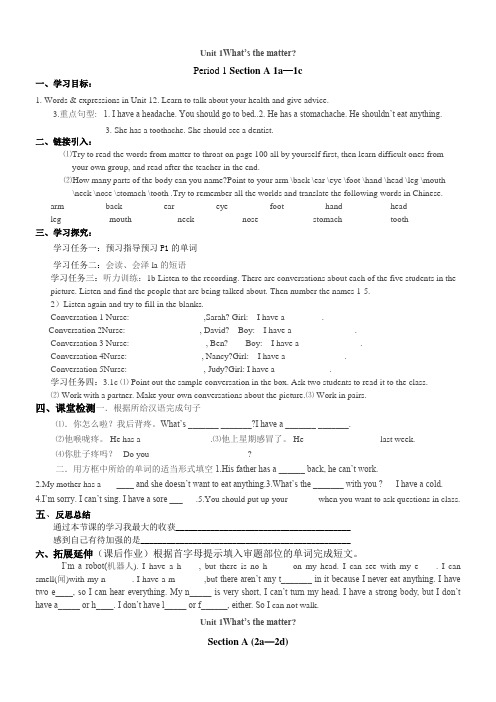
Unit 1What’s the matter?Period 1 Section A 1a—1c一、学习目标:1. Words & expressions in Unit 12. Learn to talk about your health and give advice.3.重点句型: 1. I have a headache. You should go to bed..2. He has a stomachache. He shouldn’t eat anything.3. She has a toothache. She should see a dentist.二、链接引入:⑴Try to read the words from matter to throat on page 100 all by yourself first, then learn difficult ones fromyour own group, and read after the teacher in the end.⑵How many parts of the body can you name?Point to your arm \back \ear \eye \foot \hand \head \leg \mouth\neck \nose \stomach \tooth .Try to remember all the worlds and translate the following words in Chinese.arm _________back _________ear _________eye _________foot _________hand __________ head __________ leg __________ mouth __________neck __________ nose __________ stomach __________ tooth_________ 三、学习探究:学习任务一:预习指导预习P1的单词学习任务二:会读、会泽la的短语学习任务三:听力训练:1b Listen to the recording. There are conversations about each of the five students in the picture. Listen and find the people that are being talked about. Then number the names 1-5.2)Listen again and try to fill in the blanks.Conversation 1 Nurse:_________________,Sarah? Girl: I have a ________.Conversation 2Nurse:_________________, David? Boy: I have a ______________.Conversation 3 Nurse: _________________, Ben? Boy: I have a ______ _______.Conversation 4Nurse:_________________, Nancy?Girl: I have a _____________.Conversation 5Nurse: _________________, Judy?Girl: I have a ____________.学习任务四:3.1c ⑴ Point out the sample conversation in the box. Ask two students to read it to the class.⑵ Work with a partner. Make your own conversations about the picture.⑶ Work in pairs.四、课堂检测一.根据所给汉语完成句子⑴.你怎么啦?我后背疼。
八年级英语下1-3单元导学案
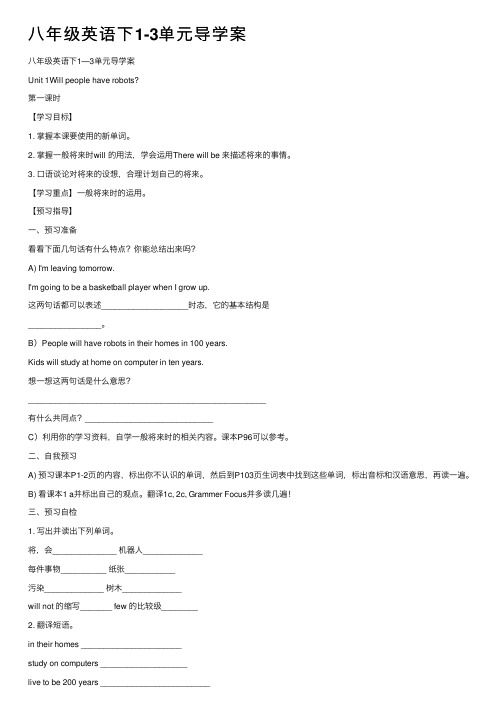
⼋年级英语下1-3单元导学案⼋年级英语下1—3单元导学案Unit 1Will people have robots?第⼀课时【学习⽬标】1. 掌握本课要使⽤的新单词。
2. 掌握⼀般将来时will 的⽤法,学会运⽤There will be 来描述将来的事情。
3. ⼝语谈论对将来的设想,合理计划⾃⼰的将来。
【学习重点】⼀般将来时的运⽤。
【预习指导】⼀、预习准备看看下⾯⼏句话有什么特点?你能总结出来吗?A) I'm leaving tomorrow.I'm going to be a basketball player when I grow up.这两句话都可以表述___________________时态,它的基本结构是________________。
B)People will have robots in their homes in 100 years.Kids will study at home on computer in ten years.想⼀想这两句话是什么意思?____________________________________________________有什么共同点?____________________________C)利⽤你的学习资料,⾃学⼀般将来时的相关内容。
课本P96可以参考。
⼆、⾃我预习A) 预习课本P1-2页的内容,标出你不认识的单词,然后到P103页⽣词表中找到这些单词,标出⾳标和汉语意思,再读⼀遍。
B) 看课本1 a并标出⾃⼰的观点。
翻译1c, 2c, Grammer Focus并多读⼏遍!三、预习⾃检1. 写出并读出下列单词。
将,会______________ 机器⼈_____________每件事物__________ 纸张___________污染_____________ 树⽊_____________will not 的缩写_______ few 的⽐较级________2. 翻译短语。
八年级上册英语第1至3单元导学案

卫民中学高效课堂八年级英语导学案 Unit 1How often do you exercise ?Section A一、教师寄语A bold attempt is half success.(勇敢的尝试是成功的一半) 二、学习目标 知识目标:Words: always, usually , often, sometimes , hardly , ever, never., once , twice , Phrases: how often three times a week every day. twice a week Sentences:What do you usually do on weekends? I sometimes go to the beach. How often do you eat vegetables? Every day. Most students do homework every day.能力目标: 会使用频率副词及短语;能描述课余时间的活动安排; 情感目标:培养学生良好的学习和生活习惯 三、教学重、难点频度副词:always, usually, often, sometimes, hardly 和never 的应用 疑问词how 的用法 四、学习过程 1预习导学或自测Ⅰ.Look at the picture (学生识图).What do you usually do on weekends? I sometimes go to the beach.. I sometimes 去滑板看书 看电视做运动 购物 Ⅱ.看图写出相应的頻度副词:2.自主学习Pairwork.How often do you eat vegetables? Every day.Activities How often a. go to the movies Every day b. watch TV Once a week c. shop Twice a week d. exercise Three times a week e.read Once a weekTwice a week3.合作探究 Ⅰ.maybe / may be①.The baby is crying she is hungry. ②.The woman a teacher .maybe 是副词,意为“大概,可能,或许”,一般用于句首。
人教版八年级英语下册unit1 第三课时导学案

She lied to her mother.她对她妈妈撒谎了
He laid the egg on the table carefully.他小心地把鸡蛋放在桌子上。
The cock never lays eggs.大公鸡从不下蛋。
巧记口诀
规则是撒谎: lie-lied-lied;不规则是躺:lie-lay-lain躺过就下蛋lay-laid-laid,下蛋不规则
合
作
探
究
导
学
过
程
四
步
设
计
交
流
展
示
【交流展示】
1.自主学习后,我还有不明白的问题。
2.check 3a,3b each other
3.小组成员轮流读3a并翻译,划出疑难准备提问。
庙渠初中“三环四步”导学案
年级
八
科目
英
课题
Unit 1第三课时
主备人
周次
教学辅助手段
导学
目标
1掌握有用短语,复述课文。
2 if引导的条件状语从句。
重点
难点
如何正确开展急救,培养互帮互助的精神。
导学
模式
自学--------展示-------反馈
导学策略及学法指导(师生互动设计)
导
学
过
程
四
步
设
计
自
主
学
习
导学策略及学法指导(师生互动设计)
反
馈
检
测
教
后
反
思
【合作探究】
I think you should lie down and rest.为你应当躺下休息。
- 1、下载文档前请自行甄别文档内容的完整性,平台不提供额外的编辑、内容补充、找答案等附加服务。
- 2、"仅部分预览"的文档,不可在线预览部分如存在完整性等问题,可反馈申请退款(可完整预览的文档不适用该条件!)。
- 3、如文档侵犯您的权益,请联系客服反馈,我们会尽快为您处理(人工客服工作时间:9:00-18:30)。
八年级英语导学案Unit1 Topic3 SectionA导学目标掌握本课的重点短语及句型。
make many friendsjoin /be/take part in + 活动I’ll be in the long jump and the high jump.It’s one’s first time to do sth. 某人第一次做某事自主学习:1. 听1a录音,完成1b的填空。
2. 读1a对话,翻译下列习语。
(1)谈论某事_______________ (2)学校运动会__________________(3)参加_________________(4)be in________________3.将2a的图片和文字搭配起来。
4.看2a,翻译下列习语。
(1) my first time to do sth. _________ (2) have lots of fun _____________________ (3).为…做好准备__________________. (4)尽我最大努力___________________ (5)交许多朋友____________________ (6) relay race _____________________5.听录音,完成Page18:3。
合作探究1.Pair work(两人一组练习1a对话)2.两人一组,根据2a信息编对话,完成2b。
展示提升1.展示自主学习2.展示合作探究自主练习单选( )1.I bought a pair of running shoes because I want to _______ the teachers’relay race.A.joinB.join inC.take partD.have part in( )2.—_______—The long jump.A.What sport will you take part in?B.Which sport will you have partC.What are you going to do?D.What’s the matter?( )3.Li Ming will take part in the boys’ _______.A.800-meter raceB.800-meter racesC.800 meter raceD.800-meter-races( )4.My foreign friend, Tom, will come to _______.A.cheer me upB.cheer up meC.cheer me onD.cheer on me( )5.—Hi, I’m Xiao Li, I’m very glad to _______ friends _______ you.—Me too. I’m Xiao Wang.A.get; likeB.make; withC.get; withD.make; toUnit1 Topic3 Section B导学目标1.自学理解对话内容。
2.通过自学及合作探究,熟练掌握和运用下列短语、句型。
Let’s make(约定)it half past six.make sth/sb+adj make sb do sth 使某人做某事go to the movies/cinema 去看电影When/where shall we meet?导学重点难点shall 用于第一人称的一般将来时自主学习1.听1a录音,完成1b。
2.再听1a录音,完成1c的表格。
3.在1a中找出并翻译下列习语。
(1)Is that Michael? __________________ (2)Speaking ____________________ (3)The school sports meeting is coming.________________(4)Let’s make it half past six ________________(5)See you then _____________________4.听录音,完成page20:2。
合作探究1.两人一组,练习1a对话。
2.Pair work(根据1d所给信息编对话)展示提升1.展示自主学习2.展示合作探究快乐过关(一) 总结一般将来时:回答下面的问题,并完成后面的练习。
1. 一般将来时描述什么?一般将来时描述____________________ 发生的事或存在的状态。
2. 一般将来时的谓语如何构成?用情态动词____________或_____________ 加动词的____________构成。
__________常用于第一人称,但多数情况下可用__________替换。
3. 描述将来时间的词或短语有哪些?试举例:_____________________________________________________4. 一般将来时的句式如何变化.?否定句:在___________ 或____________ 后加not, will not缩写成___________一般疑问句:将_____________ 或____________ 提前。
5. We are going to have a sports meet. 这句是否是一般将来时?_________它的谓语结构是什么?___________________6. The school sports meet is coming. 这句是否是一般将来时?_____________它的谓语结构是什么?___________________Unit1 Topic3 Section C导学目标1.掌握Page21-22的单词。
2.自学理解文章内容。
3.熟练掌握和运用下列短语、句型。
for the first time 第一次stand for sth 代表某物/事a symbol of ......的标志at least 至少every four years每四年一次hold the Olympics 举办奥运会导学重点难点1. 认真阅读Unit1 Topic3 Section C,并对语言点、难点做出标记.2. 学习学案,并完成学案上的练习题.自主学习1.读1a短文,找出并翻译下列习语。
(1)the modern Olympics ______________ (2) 一个…的标志______________ (3)代表_______________ (4)至少________________(5)每四年一次______________(6)全世界______________(7)in the future______________ (8)hold the Olympics______________2.读1a短文,完成1b。
3.完成Page22:2。
完成Page22:3。
合作探究小组讨论自己遇到的疑难问题。
展示提升1.展示自主学习2.展示合作探究快乐过关(一)根据句意及汉语提示填空。
1.The computer will cost at _______(至少)10,000 yuan. It’s too expensive.2.Er Yuehe is one of the _______(当代的) writers.3.China h_______(主办) the 2008 Beijing Olympic games.(二)根据汉语意思完成句子。
1.老师认为和学生在一起将获得极大的乐趣。
Teachers think they will_______ much_______with the students2.王红在游泳方面做得好。
Wang Hong _______ _______ _______ swimming.3.有多少国家参加了2008年北京奥运会?How many countries _______ _______ _______ the 2008 Beijing Olympics?4.我们的城市将有更多更宽阔的道路。
There _______ _______ more and more wide roads in our city.5.CBA代表什么?What does CBA _______ _______?6.李明擅长跳远。
Li Ming_______ _______ _______ the long jump.Unit1 Topic3 Section D导学目标1.掌握Page23-24的单词。
2.自学理解文章内容。
3.熟练掌握和运用下列短语、句型。
hold a sports meet win first place do badly indo one’s best some day be able to导学重点难点训练阅读能力自主学习1.完成23页Grammar和Functions的填空,并翻译其中的句子。
2.读23页的短文,找出并翻译下列习语。
(1)hold a sports meet _____________ (2) win first place______________(3)在某方面表现差_______________ (4)尽某人最大的努力________________ (5)cross the finish line______________ (6)some day______________(7)be able to______________3.读23页的短文,完成24页的判断题。
合作探究小组讨论自己遇到的疑难问题。
展示提升1.展示自主学习2.展示合作探究快乐过关(一)单选()1.At last, our class ____the basketball.A. WinB. wonC. winningD. Beat( )2.I’ll take part in the long jump. Will you____ me ____?A. cheer, onB. cheer, withC. cheer, upD. cheer, over( )3.---When shall we meet?---Let’s____ it five o’clock.A. haveB. getC.doD.make(二)句型转换1.Mike is going to take part in the sports meet.(改为一般疑问句)2.I think i will win the game.(改为否定句)3.She will take part in the long jump.(改为否定句)4. They are going to be in the boys’ 800-meter race.(改为同义句)。
